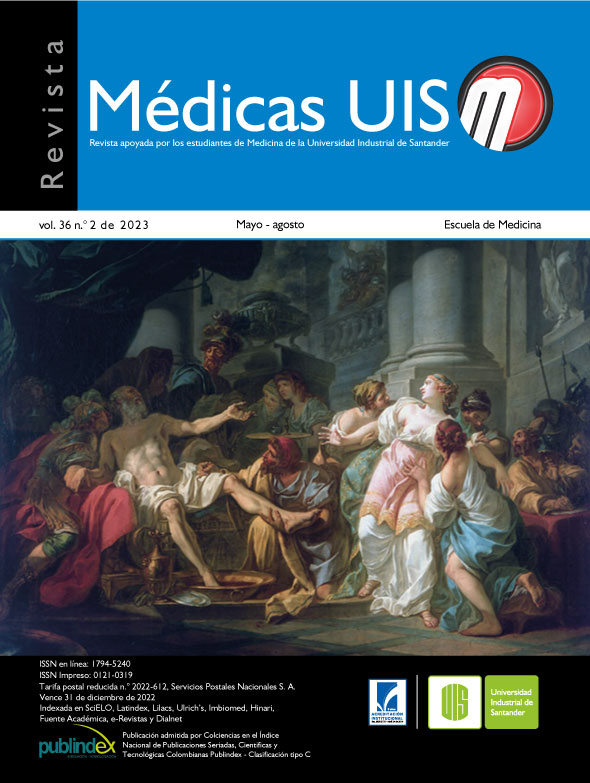Abstract
Introduction: The need for information due to ignorance of Sars-CoV-2 led researchers to write and publish a large amount of information. Colombia is the second within Latin American countries with the highest scientific production on SarsCoV-2. Objective: to characterize the trend of scientific collaboration between Colombia and Latin American and Caribbean countries on COVID-19. Materials and methods: bibliometric study, the records were acquired from Scopus (2020 - 2021) with the terms COVID-19, 2019-nCoV, new coronavirus, coronavirus disease 2019 and Sars-CoV-2. Indicators of production, collaboration and visibility were analyzed. Results: 77 records were recovered. The production growth rate was 65.51%. The transience index reached 86.69%. The most productive author was A.J. Rodríguez Morales of the Autonomous University Foundation of the Americas and the Technological University of Pereira of Colombia (14.28%). 96.10% of the investigations came from universities. The inter-Latin American collaboration rate reached 11.66% with a collaboration index of 3.71 ± 3.09. The density of the network was 0.51. The greatest collaboration occurred with authors from Mexico (n= 27), Peru (n= 26), Chile (n= 25) and Argentina (n= 23). Argentina presented a higher degree of improvement (176) and number of citations (55.03) and Chile a higher eigenvector (0.35). The connection between the number of citations and the degree of centrality was 0.9. Conclusion: Colombia tends to participate in international projects and with Latin America and the
Caribbeancountries with greater capacity to develop research.
References
Torres-Salinas D. Ritmo de crecimiento diario de la producción científica sobre Covid-19. Análisis en bases de datos y repositorios en acceso abierto. EPI. 2020; 29(2): Profesional De La información.
Johns Hopkins University. Coronavirus Resource Center [Internet]. Baltimore, Maryland; Johns Hopkins University & Medicine. [citado 24 mayo 2022]. Disponible en: https://coronavirus.jhu. edu/map.html.
Belli S, Mugnaini R, Baltà J, Abadal E. Coronavirus mapping in scientific publications: When science advances rapidly and collectively, is access to this knowledge open to society?. Scientometrics. 2020;124(3):2261-2285.
Gallegos M, Cervigni M, Consoli AJ, CaychoRodríguez T, Polanco FA, Martino P, et al. COVID-19 in Latin America: A Bibliometric Analysis of Scientific Publications in Health. Electron J Gen Med. 2020;17(6):em261
World Health Organization. WHO health emergency dashboard [Internet]; 2019-2023. [Citado 8 de Mayo de 2022].Disponible en: https://covid19.who.int/table.
Gregorio-Chaviano O, Limaymanta CH, LópezMesa EK. Análisis bibliométrico de la producción científica latinoamericana sobre COVID-19. Biomédica. 2020;40(2):104-115.
Forero-Peña DA, Carrión-Nessi FS, Camejo-Ávila NA, Forero-Peña MJ. COVID-19 en Latinoamérica: una revisión sistemática de la literatura y análisis bibliométrico. Rev Salud Pública. 2020;2(2):216.
Zhang L, Zhao W, Sun B, Huang Y, Glänzel W. How scientific research reacts to international public health emergencies: a global analysis of response patterns. Scientometrics. 2020;124(1):747-773.
Amariles P, GranadosJ, Ceballos M, Montoya CJ. COVID-19 in Colombia endpoints. Are we different, like Europe? Res Social Adm Pharm. 2021;17(1):2036-2039.
Huamaní C, Mayta-Tristán P. Producción científica peruana en medicina y redes de colaboración, análisis del Science Citation Index 2000-2009. Rev Perú Med Exp Salud Pública. 2010;27(3):315-325.
Corrales-Reyes IE. Coautoría y redes de colaboración científica en Medwave. Medwave. 2017;17(9):7103.
Tao Z, Zhou S, Yao R, Wen K, Da W, Meng Y, et al.COVID-19 will stimulate a new coronavirus research breakthrough: A 20-year bibliometric analysis. Ann Transl Med.2020;8(8):528.
Miguel S. Revistas y producción científica de América Latina y el Caribe: su visibilidad en SciELO, RedALyC y SCOPUS. Rev. Interam. Bibl. 2011;34(2):187-99.
Díaz Pinzón JE. Precisión del pronóstico de la propagación del COVID-19 en Colombia. Repert Med Cir. 2020; 29(Supl 1):27-33.
López de Parra L, Polanco Perdomo V, Correa Cruz L. Mirada a las investigaciones sobre formación investigativa en la universidad latinoamericana: estado del arte 2010 a 2017. Rev.Investig.Desarro.Innov. 2017;8(1):77-95.
Ciocca DR, Delgado G. The reality of scientific research in Latin America; an insider's perspective. Cell Stress Chaperones. 2017;22(6):847-52.
Montiel F. COVID 19: la respuesta universitaria en América Latina [Internet]. Horizontes. 2021 Mar15 [Citado 2022 May 3]. Disponible en: https:// horizontesrevistacel.wixsite.com/horizontes/ post/covid-19-la-respuestauniversitaria-enam%C3%A9rica-latina.
Hoekman J, Frenken K, Tijssen RJW. Research collaboration at a distance: Changing spatial patterns of scientific collaboration within Europe. Research Policy. 2010;39(5):662-73.
Cabieses B, Darrigrandi F, Obach A. Factores asociados a sentirse preparado para enfrentar el COVID-19 en migrantes internacionales en Chile. Rev. Inst. Salud Pública Chile. 2020;4(2):29-36.
Castillo JA, Powell MA. Análisis de la producción científica del Ecuador e impacto de la colaboración internacional en el periodo 2006- 2015. Revista Española de Documentación Científica. 2019;42(1):e225.
Ronda-Pupo GA. Knowledge map of Latin American research on management: Trends and future advancement. Inf.sci.soc.2015; 55(1):3-27.
Cucunubá Zulma M.Investigación científica prioritaria en Latinoamérica para orientar la prevención y el control de la COVID-19. Biomed. 2020; 40( Suppl 2 ): 9-13.
Sebastián J. La cooperación como motor de la internacionalización de la investigación en América Latina. Revista CTS. 2019;14(42):79-97.
Tremolada AE. ¿La Alianza del Pacífico facilita la inserción de Colombia en la región Asia-Pacífico?. Pap.Polit. 2014;19(2):721-752.
Villasis-Keever MÁ, Escamilla-Núñez A, DuránMuñoz CA, García H, Rojano-Mejía D, MirandaNovales MG, et al. Análisis bibliométrico de las publicaciones científicas sobre COVID-19 realizadas por personal IMSS. Rev Med Inst Mex Seguro Soc. 2022;60(Suppl 2):77-85.
Wang Y, Zhao H. Digital data-based strategies: A novel form of better understanding COVID-19 pandemic and international scientific collaboration. PLoS One. 2021;16(4):e0249280.

This work is licensed under a Creative Commons Attribution 4.0 International License.
Copyright (c) 2023 Médicas UIS

